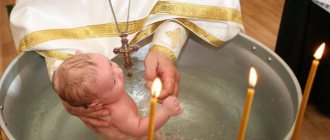A godfather is chosen once and for life. He can be “demoted” only in one case: if his godfather decides to change his faith. Even if he goes astray, wallows in sin or commits murder, it is impossible to renounce his godfather. All that remains is to pray for his salvation. Therefore, parents so carefully choose a recipient - a guarantor who, after Baptism, will lead their son or daughter along the right path. The choice is complicated by church prohibitions, because of which not everyone can be taken as godparents.
Guarantor for the debtor
The godfather is not just a witness to the Sacrament, from which the path to God begins. He becomes for the baptized a mentor and guide in the world of spiritual values. He tirelessly prays for his godson, teaches him piety, meekness, hard work, and love for his neighbor. Receiver from Greek means “guarantor for the debtor.” It is not for nothing that the Ecumenical Saint John Chrysostom exclaimed in one of his conversations regarding succession: “If you have guaranteed, take care as if you were obliged to pay.”
The godfather participates in the upbringing of the godson and is directly responsible if the ward goes astray. In fact, he is the second father or mother, who are responsible not for material support, but for the spiritual development of the child. The same John Chrysostom has the words that those who have accepted the guarantee, that is, godfathers and mothers, should show great care, make suggestions, give advice and correct with fatherly love. “And if they fall into idleness,” the Saint warned, “they will be condemned.” During the Sacrament, the godparents vouch for the child before God, and are accountable to the Lord for their negligence.
During the Sacrament, it is the godfather who holds the boy in his arms, and the godmother who holds the girl. The recipient reads for the baby (or the one who, due to deafness, muteness or other illness, cannot speak for himself) the Symbol of Faith and answers the priest’s questions. When the godson grows up, the godson explains to him the basics of Orthodoxy, takes him to church and to Communion, congratulates him on Orthodox holidays and tells their history, introduces him to the Lives of the Saints, etc. The duties of the godson assume that he himself has been baptized in Orthodoxy and is a sincere believer. That he knows at least the Holy Scriptures and basic prayers, and also regularly attends church services.
Why are godparents needed?
Physically, a child is born on the day of birth, however, in accordance with Orthodox canons, his spiritual birth occurs precisely at the moment of the sacrament of baptism. And, according to the rules, his successors, or godparents, must participate in this ritual. It is they who will introduce the godson or daughter to the church, instill in him (or her) the love of God and pray for him during each visit to the temple. In addition, according to Orthodox tradition, godparents become the spiritual mentors of their godson for life. This means that he will be able to turn to them for advice at any time, and they, in turn, will have to give him wise (and correct from a religious point of view) advice.
Two or one
The personal presence of a godfather at the baptism of a boy and a godmother at the baptism of a girl is mandatory. You cannot become a godparent remotely, because this directly contradicts the canons of the sacrament, in which the godparent must read prayers and make vows for the godson. The first vow is renunciation of the devil, a promise not to sin and not to resist God's will. The second is to believe in Christ and do good deeds.
In the first centuries of Christianity, baptism was performed according to gender. The man was baptized by a deacon, the woman by a deaconess. They became godparents. And today, according to the Trebnik, only one godfather is needed: for a boy - a man, for a girl - a woman. But according to tradition, which has taken root in Russia since the 15th century, one child can have two godparents - a woman and a man. By analogy with two physiological parents.
“Godparents and parents must teach the child to live like a Christian”
The baptism of a child is an important, perhaps even the main event in his life and in the life of his parents. But how to properly prepare for baptism, how to choose godparents, and why do Saratov churches now hold public conversations before baptism? We asked these questions to the clergyman of the Holy Trinity Cathedral in Saratov, Hierodeacon Paisius (Shurukhin).
PREPARATION
| Hierodeacon Paisiy (Shurukhin) |
– Father Paisiy, I know that you conduct public conversations before the baptism of children.
How long ago was this innovation introduced in Saratov churches and why? – Such conversations are held before the baptism of not only children, but also adults; this is not an innovation. Catechetical conversations as a communication of Christian teaching to those entering the Church have been carried out in the Church since its inception. The Lord said to the apostles: “...go and teach all nations, baptizing them in the name of the Father and the Son and the Holy Spirit, teaching them to observe everything that I have commanded you” (Matthew 28:19). This “teach” is the Lord’s indication of the need to teach the basics of faith before receiving baptism.
Teaching the fundamentals of the Christian faith was already known in the apostolic period of the Church: it is known that the apostle and evangelist Mark founded the catechetical (Alexandrian) school for the instruction of converts. The announcement in the ancient Church took from forty days to three years. The catechumen had to have a recipient - a witness who vouches before the bishop or presbyter for the sincerity of the intentions of the person wishing to become a member of the Church.
In pre-revolutionary Russia, the announcement took place over six weeks. Only after this could a person be baptized. The situation changed during the Soviet years, when the announcement and baptism itself were practically prohibited. Only recently has the state ceased to be an implacable enemy of the Church, and now the practice of announcement has been reintroduced. Every person should be familiar with the basic tenets of our faith, be able to correctly justify why he believes so, and explain how Orthodoxy differs from other religions and denominations.
Now we hold two conversations for one and a half to two hours, people can’t stand it anymore.
– Do public conversations take place with both parents and godparents?
– We must prepare people for their future responsibility - to be godparents. Therefore, conversations are mandatory for godparents. Of course, the presence of parents is also desirable.
CHOICE OF GODPARENTS
– Father Paisiy, tell me, can any people from the parents’ circle become godparents or should godparents still be churchgoers?
– The latter is a prerequisite. Godparents must be not only baptized, but also churchgoers. Unfortunately, at present this is not always observed, and when you talk to godparents at public meetings, they cannot even recite the Creed (a brief summary of Orthodox doctrine) by heart.
A man once came up to me and asked why public conversations were needed, he said: “I am already a godfather, I have godchildren, and I want to become a godfather again.”
In the conversation it became clear that he did not know the Creed, he was not a church member himself, and he had never brought a single godson to church for Communion. We just sat at the table after the baptism and went our separate ways. There is no spiritual education for godchildren, but it shouldn’t be like that: how can a person be responsible for something about which he has no idea? And godparents are, first of all, spiritual educators. If the child’s father and mother are his physical parents, then his godparents are his spiritual mentors, they are obliged to help the godson become an Orthodox person. When a child is baptized, they make serious vows before the Lord. A person who does not know the doctrine and laws of the Church, who does not live the church life, cannot be a spiritual educator of a boy or girl. The Church has blessed the baptism of children from infancy. Because it is difficult to imagine an Orthodox family where the parents will be baptized, but their child will not. But the baby himself cannot give a conscious oath of allegiance to God, and his godparents do this for him.
Baptism is like a second birth, spiritual. It is the door to the Church. A person who is baptized becomes a member of the Church and finds himself on its threshold. This is the beginning of the journey. In the future, it depends on him whether he will move forward. Of course, the road ahead is difficult, but the Lord did not promise us an easy path. And godparents are called upon to help the child walk.
– If a person does not know whether he is baptized or not, can he become a godparent?
- No, only a baptized person can be a godfather. If a person does not know whether he was baptized in childhood, he needs to turn to a priest and be baptized with the rite “if not baptized.” Only after it can a person become a godfather.
– Is it necessary to have two godparents?
- No, not necessarily. The presence of two receivers is a Russian tradition. According to the rules of the Church, one godfather is enough: a godfather for a boy and a godmother for a girl. In practice, gender mismatch is tolerated.
– What age should godparents be?
– You can become a godfather starting from the age of 14. At this age, the Church considers the child to be old enough to make important decisions in his life. There is no upper age limit, unless, of course, the potential godfather has mental disabilities or some serious illness. Parents cannot be the guardians of their own children. In general, spouses cannot be godparents of the same child.
– To summarize, what are, so to speak, the basic requirements for godparents?
– Firstly, they must lead a godly life. Secondly, they must realize the depth of the upcoming responsibility. Thirdly, of course, future godparents must be or become churchgoers who regularly participate in the church Sacraments of Confession and Communion. Godparents must engage in the spiritual education of the child, teach him faith, accustom him to prayer, Communion and church life, read him relevant literature, so that the Church becomes a part of the child’s life. Based on this, the child’s parents should choose godparents, and not simply because these people are well known to them. Parents should be sure that they will not make a mistake in choosing godparents for their child.
– That is, a great responsibility falls on the godparents and parents of the child being baptized? It’s just that often the fact of their child’s baptism does not bring any changes to people’s lives.
– Yes, and this responsibility is great. Unfortunately, many people treat faith as something abstract, as an ordinary philosophical theory. But if a person does not strive to become a church member, it is unlikely that anything will change in his life even after baptism. When immersed in the font, a person is freed from all sins, including the original sin. And in the future it depends on the person whether to commit new sins or fight against them. And the responsibility of parents and godparents is very great: they must teach the child to live like a Christian, according to the commandments of God. If the recipients do not do this, the sin of breaking the oath will fall on them. In this case, they leave the child without their protection. If the godfather does not fulfill his duties, then there is absolutely no point in him as a successor. When a person becomes a godfather, he must understand the depth and importance of the event taking place.
WHEN SOMEONE IS AGAINST
– It happens that one of the child’s parents adheres to a different religion. Is it then possible to baptize a child according to Orthodox canons?
– Of course, it is possible if the second parent agrees to the baby’s baptism and his Orthodox upbringing. If he is against it, then it is necessary to look at the situation. Sometimes children are brought to be baptized secretly. There have been cases where the mother is a Christian and the father is a Muslim. But then one parent can put the whole family at risk. How will the father react to this fact? There may be a scandal, and even the family will be destroyed. Therefore, it is difficult to give a definite answer. In such a situation, it is better to approach the priest and outline in detail all the life circumstances of a particular family. But in general, the Church does not recommend marrying someone of a different faith, so that such disagreements do not occur. Because a person may neglect his faith for the sake of preserving his family; at first he will have difficulty attending worship services, and then he may fall away from the faith.
– Is it possible to baptize a child if one or more family members are against it?
– You should try to persuade such people to meet with the priest. The main thing here is to understand what is inside a person, why he refuses to baptize his child. If people are atheists, it can be difficult to convince them to give up their views. But it is still possible to convince of the need for a calm and loyal attitude towards the fact of a child’s baptism.
– Are there cases when parents did not baptize a child, did not consider it necessary, but he, having reached adulthood, came to be baptized himself?
– After fourteen years, a teenager can come on his own, without parents or godparents, and be baptized. But such situations should be considered separately in order to reduce the possibility of creating scandals in the family. We had cases when family members almost fought a war with a family member who had been secretly baptized. But over time, the quarrels smoothed out, and the family slowly came to terms with what had happened.
– When performing the Sacrament of Baptism, boys are brought into the altar, but girls are not. What is this connected with?
– Since ancient times, it so happened that women could not enter the altar without a special blessing. And women are not allowed to enter the altar. Therefore, during the ritual of churching, which takes place immediately after baptism, boys, as future men, are brought to the altar, and girls are brought to the royal doors.
– When baptized, a child is sometimes given a different name than the one chosen by the parents and included in the documents. What determines the priest’s choice of this or that name?
– If the baby is given a name that is not in the Orthodox monthly book, then in this case they look at the memory of which saint is celebrated on the child’s birthday, on the eighth day after birth or on the day of his baptism, or they simply select an Orthodox consonant name for baptism. The name of a saint revered in the family may be chosen. In the documents, of course, the same name will remain, but in the Church a person must give his church name, which he received in the Sacrament of Baptism.
Father - yes, monk - no
The absence of a worthy candidate for recipient should not become a reason for refusing Baptism. The role of godfather can be performed by a priest. This is how it was, in fact, before, because the priest ideally fits all the criteria for an impeccable recipient.
But a monk cannot become a godfather. This seems strange, because a monk is an ideal candidate who knows the Word of God perfectly, leads a righteous life and shows by personal example the ways to serve the Lord. However, according to the Great Book of Breviaries, succession to monks is prohibited, because it “involves them into communication with the world.”
Is it possible to baptize a child without godparents?
There are times when there is no person in the immediate environment who is ready to become a godfather for a child. You should go to the temple, where the priest himself will either become a recipient, or ask one of the parishioners. In emergency situations, when the child’s life is in danger, Baptism occurs immediately.
It is important to know that it is impossible to “re-baptize” a child or choose other godparents if there is a conflict with the existing ones or they have fallen away from Orthodoxy (consult your priest on this issue).
The insane and the sinners
People with clouded minds, as well as those who are completely ignorant in matters of faith, should not be chosen as godparents. They will not be able to provide proper spiritual education to the ward. Those who sin a lot, do not go to church and do not confess, as well as criminals and “in general, persons who have fallen low in the eyes of society due to unworthy behavior,” cannot become recipients either. This prohibition is understandable: one who is mired in sin cannot serve as an example and teach righteousness.
Those who have not confessed or received communion for more than 5 years, but want to become godparents, should go to church. Otherwise, they cannot become recipients.
Spiritual kinship
Spouses cannot become godmother and father of the same child. The fact is that during Baptism, recipients acquire spiritual kinship. And this, according to the circular decree of the Holy Synod of January 19, 1810, is an obstacle to marriage. For the same reason, the bride and groom who plan to get married in church should not be invited to be godparents. As godparents of one child, they may be denied church registration of the union. True, in practice this happens extremely rarely. At the same time, spouses are not prohibited from being godparents of different children from the same family, provided that they were not baptized at the same time.
Spiritual kinship after baptism arises between godparents and parents of the godson. Therefore, as the Holy Synod explained, the godfather will not be able to marry the godson’s mother in the future, and the godmother will not be allowed to marry the goddaughter’s father. Moreover, children of godparents will not be able to marry a godson or goddaughter. According to Chapter 50 of the City Law, marriage between those who are spiritually related is prohibited “up to the seventh generation.” But siblings, father and daughter, as well as mother and son can be godparents for the same child. They will not get married under any circumstances, so they may well become spiritual relatives.
Special cases
Choosing a godfather is a difficult question. It can be difficult to find a worthy and close acquaintance to offer him such a role. In this case, the Orthodox Church allows relatives to become godparents.
Grandmother with granddaughter
A believing grandmother can be the spiritual guardian of her granddaughter if her age does not exceed 70 years. The age limit imposed by the church is explained by the duties of the godmother. An old woman should have enough strength to influence a young girl morally, have the strength to take her to church, the memory to explain the basics of Orthodoxy and teach her prayers.
Grandfather with grandson
A grandfather should be a moral authority for his grandson. His age, like his grandmother’s, should not be older than 70 years.
Aunt for niece
An aunt is a close person for the family. Her choice for baptism of her niece depends on intra-family relationships and attitude towards faith.
Native sister
A sister, if she is 14 years old, can become a godmother to her younger sister or brother.
Main requirements for a sister:
- must be baptized;
- attend church;
- know the Creed;
- realize responsibility.
Children under 14 years of age are considered minors and cannot be held responsible for their actions.
Sister's brother
A sibling, like a sister, can be a godfather for a sister if he is 14 years old, baptized in Orthodoxy, knows prayers and understands what the responsibilities of a godfather are.
Catholic from Orthodox
When Baptism takes place outside of Russia, in a Catholic country, it can be difficult to find an Orthodox person suitable for the duties of a godparent. In this case, the Orthodox Church allows you to choose a person of the Catholic or Protestant faith as godparents.
Cousin
Cousin relationship is not an obstacle to fulfilling the duties of a successor if all other necessary conditions are met.
Uncle for nephew
An uncle, like an aunt, can be a guardian for a nephew. In this case, the following conditions must be met:
- baptized in the Orthodox faith;
- his wife will not be his nephew's godmother;
- in the future he does not plan to marry his godfather (if he is single).
A godfather relative must be present at the ceremony. His name will be entered on the baptismal certificate and in the church register of converts.
Parents
In his essay “Nomocanon at the Great Trebnik,” Professor A. Pavlov mentioned that the ancient Church did not forbid parents to become godparents for their children. According to A. Pavlov, parents already perform the functions of receivers, taking care of the moral education of their children. The ban appeared later, with an eye on the spiritual kinship acquired at baptism or wedding.
Today, a mother and father can baptize a baby without a child. The only exception is the baptism of a newborn before the 40th day after birth. In this case, a special “cleansing” prayer on the 40th day should be read over the mother.










